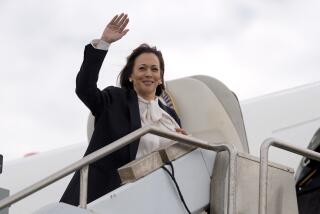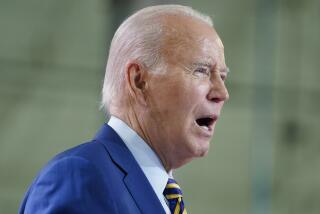Clinton Says All Businesses and Workers Will Pay for Medical Insurance : Health: President tries to sell plan to the National Federation of Independent Business. It remains opposed to the so-called employer mandate.
- Share via
WASHINGTON — President Clinton said Tuesday that every business and worker in America will be required to make “some contribution” toward the cost of buying medical insurance under the health care reform proposals he plans to introduce in September.
Such a federal mandate would require premium payments, for the first time, from about 30% of the nation’s small businesses that do not now offer health coverage and from millions of workers who have no insurance, by choice or otherwise.
“Everybody’s bills will be lower over the long run if everyone makes a fair contribution,” Clinton said, without specifying the levels that he has in mind.
The concept of a government mandate has been discussed by other Administration health care planners, including First Lady Hillary Rodham Clinton, but it was the President’s clearest articulation yet that virtually all but the unemployed will have to pay a “fair share” as the nation moves toward a system of universal coverage in which every citizen and legal resident has comprehensive medical insurance.
To an audience of small business owners, who are among the most nervous about the financial burden of health care reform, the President said: “I think that most people believe that this plan will be much tougher on small businesses than I believe it will be.”
In his address to the National Federation of Independent Business, a staunch foe of a so-called employer mandate, Clinton nevertheless urged the group to support his overall reform agenda, saying that rising medical costs are “eating us alive” and that the nation will be “strangled” unless the system is revamped.
“There is no perfect solution but I assure you that we’re all going to be better off if we enter into an honest debate and we try to work through this and we try to resolve it. The worst thing we can do is to leave it alone,” he said.
“We’ve got to do something to bring costs within inflation or it’s going to break the country,” the President added. “Costs are going up like crazy.” Clinton previously has noted that medical inflation has been rising at three times the overall rate of inflation.
During a question-and-answer period, the President drew strong applause when he said:
“I think all employees should make some contribution to their health care . . . because, if they don’t, they may get to thinking it’s free and over-utilization is one of the problems. I mean, everybody should pay something in accordance with their ability to pay.” Clinton then added that all businesses should pay as well.
As governor of Arkansas, Clinton became the only governor to receive the independent business federation’s “Guardian of Small Business” award--in recognition of the “so many different, innovative ways he found to work with small business,” according to Terry Hill, a spokesman for the group.
But now Clinton is facing stiff opposition from the federation over the employer mandate. The group is conducting a nationwide letter-writing campaign among its 500,000 members in opposition to the proposal.
“We remain firmly against it,” Hill said after Clinton’s speech. “We have been polling our members for years on this question, and the (negative) response remains above 80%.”
Hill said the federation will “try to work with” Clinton on every other aspect of his plan.
In a Woodstock, Vt., speech two weeks ago, Mrs. Clinton also sounded the theme of personal responsibility, saying that the nation no longer can tolerate people or firms that seek a “free lunch” by going without health insurance.
The President picked up on that note Tuesday, forcefully arguing that the uninsured do get care--but typically in expensive emergency rooms, with the cost of such uncompensated care passed on to those with insurance.
“Those (uninsured) folks, if they get sick, will still get health care--they’ll show up at the emergency room,” Clinton said. “But who paid for the emergency room to be there? The rest of you.”
He was short on details, such as whether part-time workers would be required to pay, and avoided discussing how he intends to finance health care reform.
Administration officials have said the White House likely will seek a payroll tax of about 7% on businesses and 2% on workers to help pay for covering the estimated 37 million uninsured. Such a “wage-based premium,” as White House officials prefer to call it, would replace what companies and employees now pay in premiums.
“Most of you are paying more than 9% a year in premiums. Most of you are paying almost twice that,” Clinton told the small business owners.
To lessen the bite of a payroll levy on small businesses, he added, it will be phased in. That will allow time for other elements of the Administration’s reform agenda to take effect.
The President noted that 70% of small businesses already provide some coverage to employees--although at inflated costs because of insurance market policies that discriminate against small groups--and said he hopes that “we don’t have to raise taxes on you to (pay for universal coverage), because people who are paying too much already shouldn’t pay more to fix the system.”
Clinton also confirmed earlier reports that he intends to fold the medical component of workers’ compensation into a new health care system, thus “dramatically” cutting the cost of worker’s compensation for businesses.
While the President was outlining his plans to the small business group, Health and Human Services Secretary Donna Shalala said in a speech to big-city health officials in Chicago that the Administration plans to include significant new spending to improve the “infrastructure” of the public health system.
“We haven’t talked about this much publicly,” she said, but the Administration hopes to use the health care reform effort to establish a “new stream of funding” for public health efforts.
How much money will be available for the public health section of the plan remains unsettled, Shalala said, adding that the President has “about 10 major decisions to make”--primarily on the cost and financing of the new system. But, she added in an interview, the emphasis on public health efforts “is something Hillary really wants to do,” and is certain to be included in the plan. Mrs. Clinton has headed the Administration’s health care reform efforts.
The public health money will be part of an overall emphasis on preventive care, Shalala said, adding that the Administration’s proposed package of benefits that companies will be required to offer to workers would almost certainly include “a lot of free stuff at the front end to emphasize prevention” that would be paid for by requiring higher co-payments and deductibles for other types of care.
Staff writers David Lauter and Karen Tumulty contributed to this story.
More to Read
Get the L.A. Times Politics newsletter
Deeply reported insights into legislation, politics and policy from Sacramento, Washington and beyond. In your inbox twice per week.
You may occasionally receive promotional content from the Los Angeles Times.










